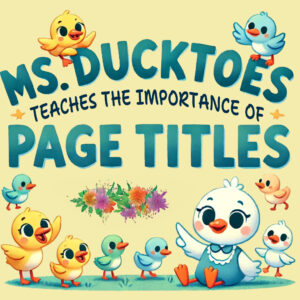Some Great Directories for SEO
Hi there! Here’s a great list of directories we at Ducktoes have collected over the years to help with SEO. It’s especially helpful for your Calgary SEO as it includes Calgary specific directories:
General Directories
Abilogic http://www.abilogic.com/ $19.95 Trust Flow:39
Go Guides http://www.goguides.org/ $69.95 Trust Flow:51
dmoz http://dmoz.org/ Free Trust Flow:82 (Temporarily closed)
Business.com http://www.business.com/info/advertise/ $299 Trust Flow:67
R-TT Web Directory http://directory.r-tt.com/ Free Trust Flow:52
Scrub the Web http://www.scrubtheweb.com/ Free Trust Flow:66
SoMuch.com https://somuch.com/ $4.95 Trust Flow: 58
Wand http://www.wand.com Free Trust Flow: 50
Canadian Directories
Canadian Culture http://www.canadianculture.com/ Free Trust Flow: 42
Canadian Directory http://www.canadiandirectory.org/ Featured: $4.95, Regular: Free, Trust Flow: 23
LocalSites http://www.localsites.ca/ Free or $9.95 Trust Flow: 40
TryCanada.com http://www.trycanada.com/ Reciprocal Link Required Trust Flow: 41
Regional Directories
Calgary Business Directory http://calgarybusinesses.ca $20 Trust Flow: 33
Alberta Business Directory http://directory.ducktoes.com $30 Trust Flow: Too new
Vancouver Business Directory http://vancouverbusinesses.net $10 Trust Flow: Too new
Comment with your favourite directory!
How I Turned My Website from a Sitting Duck into a Google Swan
A not-so-serious guide to Calgary SEO from Ms. Ducktoes herself
I’ll be honest, ducklings—my website used to be lost somewhere around page twelve of Google. You know, that deep dark swamp where good websites go to disappear. Nobody visits there. Even my mother couldn’t find me, and she once located my missing cat from a single meow behind the garage.
One night, somewhere between despair and a second cup of coffee, I decided enough was enough. If my site was going to swim with the big ducks, I needed to learn this mysterious thing called SEO—Search Engine Optimization—which, as it turns out, is really just a polite way of saying “make Google notice you without sounding desperate.”
1. Dating Google: The Awkward Phase
You can’t just shout “Pick me!” into the internet. You have to court Google.
You bring it flowers (keywords), tidy up your house (your website), and write heartfelt letters (blog posts).
Then you wait. And wait.
And when Google finally replies, it’s with something like, “That’s cute… but what about your backlinks?”
That’s SEO for you: dating someone who reads every message but only replies once every three months.
2. Calgary Businesses: You’re Not Invisible (Yet)
I’ve seen it again and again—great Calgary businesses with beautiful websites and loyal customers who are practically invisible online.
That’s where Calgary SEO waddles in.
It’s not about tricking Google. It’s about showing who you are, where you are, and why you’re worth showing off. You want Google to look at your business and say,
“Aha! That’s the best coffee shop in Calgary!”
or
“That’s the electrician everyone trusts!”
When you get that right, you’re not hiding—you’re flying.
3. Five Duck-Simple Rules for SEO
1. Don’t Quack Too Loudly
Your website isn’t a brag board. Write for your customers first. Tell them how you’ll make their lives easier, not how many awards you’ve almost won.
2. Feed Google Fresh Breadcrumbs
Keep your content fresh. New blog posts, updated photos, and recent results. Google loves activity—it’s like showing signs of life in your digital pond.
3. Swim with Friends (Links)
Good backlinks are like ducks swimming in formation. They make you look strong. Bad backlinks are like pigeons at a picnic. Avoid them.
4. Be Mobile or Be Extinct
If your website takes too long to load on a phone, your visitors are gone faster than a duck at feeding time.
5. Measure or Guess
Without analytics, you’re just tossing breadcrumbs into the wind. Use Google Analytics and Search Console so you know what’s working—and what’s just quacking noise.
4. The Calgary Edge: Local SEO
Global SEO is great, but local SEO is where Calgary businesses shine.
When someone nearby searches “best plumber in Calgary” or “SEO services Calgary”, you want to be the name that pops up first.
It’s about helping people in your own backyard find you—Google Maps, reviews, consistent contact info.
Think of it as leaving a breadcrumb trail across the city that leads straight to your door.
5. Why Ducktoes?
We don’t just tweak websites; we help them fly.
We’re Calgary locals who understand the local market and have helped everyone from yoga studios to construction companies rise from the murky depths of Google to the clear, sparkling surface of page one.
We do it with strategy, data, and a bit of humour—because SEO doesn’t have to be boring.
(Yes, I said it. SEO can be fun.)
Final Splash
If your website’s been floating aimlessly, it’s time for a little Ducktoes magic.
Let’s make Google fall in love with you—no awkward first date required.
Call (403) 483-0105 or visit Ducktoes Calgary SEO
We’ll help your business rise from the duck pond and soar.
The Importance of Page Titles in SEO: Unlocking the Secrets to Higher Rankings

Hello, my little duckies. This is Ms. Ducktoes to help you learn SEO.
Don’t Lose The Basic SEO of Page Titles
As SEO has grown from the calm waters of our cozy duck pond into the vast, choppy ocean of modern strategies, it’s easy to feel like you’re being swept away by the current. But don’t you worry—your Mama Ducktoes is here to keep you afloat! You see, the most important things you need to rank well are still swimming right here in our duck pond of basic SEO. Yes, one of the biggest feathers in your SEO cap is the humble page title. Without a great title, all your online quacking might just be drowned out by the noise. There’s so much honking about new SEO tricks that some of you sweet ducklings might overlook the simple power of a well-crafted page title. But according to some juicy tidbits from a recent Google algorithm leak, the importance of page titles in your rankings has never been greater. So, keep those titles sharp, and you’ll be paddling your way to success in no time!What’s in a Name? The Role of Page Titles in SEO
Think of your page title as the name on the front of a store. It tells potential visitors what they’ll find inside, and if it’s enticing enough, they’ll be more likely to come in for a closer look. In the world of SEO, page titles play a similar role. They’re the first thing people see in search engine results, and they give both users and search engines a snapshot of what your page is all about. But it’s not just about catching the eye of your human visitors. Google, our friendly neighborhood search engine, also pays close attention to your page titles. It uses them to understand the content of your page and to decide where to rank you in search results. And as we all know, ranking well on Google is like having the best spot on the pond—everyone can see you, and they’re more likely to stop by!A Little Leak from Google: Why Page Titles Matter Even More
Now, ducklings, I’m going to let you in on a little secret that’s been fluttering around the SEO world. Recently, there was a bit of a leak from Google’s algorithm lake—don’t worry, it’s nothing to be alarmed about, just some breadcrumbs of knowledge for us to nibble on. This leak confirmed something we’ve long suspected: Google really, really likes page titles. In fact, it’s one of the first things the search engine looks at when deciding how relevant your page is to a search query. Here’s what we learned:- Keywords are Key: Google likes it when your primary keyword is right there at the start of your page title. It’s like putting a welcome mat at your door—it shows you’re ready for the right kind of visitor.
- Originality Counts: Just like in the duck world, no two quacks are the same. Google prefers unique page titles that clearly describe your page’s content. If your titles are too similar to each other, it’s like trying to stand out in a flock of ducks—easy to get lost.
- Size Matters (a Little): While you don’t need to count every character, keeping your titles between 50-60 characters is usually a good idea. If your title’s too long, it might get clipped in the search results, and we don’t want our visitors missing out on important info!
- The Clicker’s Call: Google watches how often people click on your page titles. If a lot of folks are clicking on your title, Google takes it as a sign that your page is just what people are looking for, and that can help boost your rankings.
Best Practices for Crafting Quacktastic Page Titles
Now that you know why page titles are so important, let’s talk about how to craft the perfect one. Here are a few tips to keep your titles top-notch:- Start with a Strong Keyword: Just like a good quack gets attention, a strong keyword at the beginning of your title helps search engines understand what your page is about.
- Be Unique, Be You: Each of your page titles should be as unique as your feathers. Make sure they accurately reflect the content of your page and stand out from the crowd.
- Match Your Visitors’ Intent: Think about what your ducklings (your visitors) are searching for, and make sure your title speaks directly to their needs or questions.
- Keep It Concise: Aim for that sweet spot of 50-60 characters, ensuring your entire title shows up in search results without getting cut off.
- Make It Irresistible: Write titles that are not only informative but also engaging. Use action words that invite your ducklings to click and explore further.
Why Your Titles Deserve a Little Extra Love
As you waddle along in your SEO journey, remember that page titles are more than just a small detail—they’re a big part of your success. A well-crafted title does more than improve your ranking; it helps guide the right visitors to your pond, encouraging them to take a closer look at what you have to offer. So, my dear ducklings, take the time to perfect your page titles. With a little care and attention, you’ll be well on your way to swimming at the top of the search results pond. Stay tuned for the next installment of our “SEO for Beginners” series, where we’ll dive deeper into more tips and tricks to help your website quack its way to the top. Until then, happy title crafting!Turning the 2024 Google Algorithm Leak into a Strategic Advantage for Long-Term SEO
Introduction
In 2024, the digital marketing world was rocked by a major Google algorithm leak that unveiled critical details about Google’s search ranking system. This leak not only revealed some previously unknown aspects but also validated many existing theories and practices within the SEO community. While the immediate reaction focused on the new information, it’s important to recognize that the leak also reinforced established SEO insights.
The leaked details provided valuable insights into various facets of Google’s ranking mechanisms, including the weighting of different factors and recent algorithm updates. While some of these insights were new, many aligned with previously held beliefs about SEO practices. This combination of new revelations and validation offers a unique opportunity to refine and enhance SEO strategies.
In this blog, we will explore how to leverage the 2024 Google algorithm leak to build a more resilient and effective SEO approach. Instead of merely reacting to the new revelations, we’ll focus on how to use this information, along with the confirmed theories, to strengthen your long-term SEO strategy. By developing a robust SEO foundation, fostering authoritative relationships, and preparing for future changes, you can turn this leak into a strategic advantage. Let’s dive into how you can use these insights to elevate your SEO efforts and achieve lasting success.
Understanding the Leak

In 2024, the Google algorithm leak provided an unprecedented look into the specifics of Google’s search ranking system. Here are some of the key details revealed:
- Ranking Factors and Their Weight: The leak detailed how Google evaluates and weighs various ranking factors:
- Content Quality: High-quality, relevant content has been confirmed to be a primary factor in rankings. Google’s algorithms are increasingly sophisticated in assessing content depth, originality, and user engagement.
- Backlink Profile: The importance of backlinks was highlighted, with an emphasis on the quality and relevance of linking sites rather than sheer quantity. High-authority backlinks from relevant sources are more valuable.
- User Engagement Metrics: Factors such as click-through rates (CTR), bounce rates, and time spent on page are now more influential in ranking decisions. Google uses these metrics to gauge how well users engage with content.
- Recent Algorithm Updates: The leak exposed several recent adjustments to Google’s algorithm:
- Page Experience Signals: Google’s focus on user experience has intensified, incorporating signals such as page load times, mobile-friendliness, and overall site usability.
- AI and Machine Learning: Updates to Google’s AI and machine learning models have enhanced the ability to understand natural language and user intent. This means that content needs to be contextually relevant and well-structured to rank well.
- Local Search Enhancements: There were adjustments in how local search results are generated, with greater emphasis on user location and local relevance in search queries.
- New Evaluation Criteria: The leak introduced potential new criteria for assessing page quality:
- Content Authenticity: Google is placing more emphasis on the authenticity and credibility of content. Sites with verified expertise and trustworthiness are likely to see better rankings.
- Interactive Elements: New evaluation criteria include the presence of interactive elements, such as user polls or live chat features, which can enhance user engagement and satisfaction.
Impact on Current SEO Practices:
- Refining Optimization Strategies: With content quality and user engagement now more heavily weighted, SEO professionals should focus on creating highly relevant, well-researched, and engaging content. This includes optimizing for user intent and ensuring content depth.
- Adjusting to Algorithm Changes: Given the increased importance of page experience signals and AI advancements, it’s essential to improve site performance, mobile responsiveness, and overall user experience. Regularly updating and testing these elements will help maintain competitive rankings.
- Meeting New Criteria: To align with new evaluation criteria, websites should prioritize building credibility through authoritative content and interactive features. Enhancing site trustworthiness and user interaction can positively impact search rankings.
By integrating these specifics into your SEO strategy, you can better align with Google’s current ranking preferences and improve your site’s visibility and performance in search results.
Developing a Robust SEO Foundation

Long-Term Keyword Strategy:
The insights from the 2024 Google algorithm leak provide a valuable opportunity to refine your keyword strategy for long-term success. Understanding the current emphasis on content quality and user engagement underscores the need to carefully select and target keywords that align with your audience’s intent. Start by revisiting your keyword research to ensure you’re targeting terms that are not only relevant but also reflect the evolving search behavior of your users. Focus on creating a diverse keyword portfolio that encompasses a range of related terms and phrases. This approach helps in capturing various search queries and allows for a broader reach. By integrating both high-volume and long-tail keywords, you can better address different stages of the user journey and ensure that your content remains relevant and visible in search results.
Content Diversification:
The leak has highlighted the increasing importance of content quality and user engagement, making content diversification a crucial aspect of a robust SEO strategy. To appeal to a wide range of user preferences, consider creating various types of content beyond traditional blog posts. Incorporate videos, infographics, podcasts, and interactive elements such as quizzes or surveys. Each content type serves a different purpose and can engage users in unique ways, which is essential for maintaining user interest and improving site metrics. Diversifying your content not only caters to different user needs but also helps reduce reliance on any single ranking factor. For instance, while high-quality written content remains important, interactive elements and multimedia can enhance user engagement and contribute to better overall site performance. By expanding your content offerings, you can build a more resilient SEO strategy that adapts to changing algorithms and maintains strong search visibility.
Building Relationships with Authority

Quality Link Building:
The 2024 Google algorithm leak provides critical insights into the value of high-quality backlinks and the importance of earning them from authoritative sources. With the leak highlighting the growing significance of credible links, it’s essential to refine your link-building strategy accordingly. Focus on creating exceptional content that naturally attracts backlinks from reputable sites. This can include in-depth guides, original research, or insightful articles that offer significant value to your target audience.
Leverage the information from the leak to identify potential high-value link sources within your industry. Building authentic relationships with industry influencers, thought leaders, and other reputable content creators can enhance your link-building efforts. Engage in meaningful collaborations, such as guest posts or joint projects, and contribute to industry discussions to increase your chances of securing valuable backlinks. By prioritizing quality over quantity and focusing on genuine, relevant connections, you can build a more authoritative online presence.
Industry Networking:
Networking within your industry is essential for establishing and maintaining credibility. The leak underscores the importance of strong industry relationships for enhancing your site’s authority. Actively seek out opportunities to connect with peers, industry leaders, and other professionals through events such as conferences, webinars, and industry-specific forums. These interactions not only help in building valuable backlinks but also position you as a credible and engaged participant in your field.
To effectively build and maintain these professional relationships, approach networking with a genuine interest in collaboration and mutual benefit. Offer value to your connections by sharing insights, providing support, or contributing to joint projects. Regularly engage with your network through social media, email updates, or industry discussions to keep the relationships active and productive. By fostering a robust network of industry connections, you enhance your credibility and create opportunities for meaningful collaborations that can support your long-term SEO goals.
Future-Proofing Your SEO

Adaptive SEO Practices:
The 2024 Google algorithm leak has made it clear that SEO is an ever-evolving landscape, with changes happening rapidly and often unpredictably. To maintain a competitive edge, it’s crucial to implement adaptive SEO practices that can quickly adjust to future algorithm updates. Instead of relying on short-term tactics or overly specific optimizations, focus on core elements that consistently influence search rankings, such as user experience, site performance, and content quality.
Prioritize enhancing user experience by improving site speed, mobile responsiveness, and accessibility. Google’s ongoing focus on user-centric metrics, like page experience signals, underscores the need for a fast, intuitive, and engaging website. Additionally, pay attention to site performance, including technical SEO aspects such as structured data, proper indexing, and error-free navigation. By building a solid foundation based on these core principles, your site will be better positioned to adapt to future algorithm changes without drastic overhauls.
Continuous Learning
To truly future-proof your SEO strategy, cultivating a culture of continuous learning and improvement is essential. The SEO landscape is dynamic, and staying informed about the latest trends, updates, and best practices is vital for long-term success. Regularly consume reputable SEO resources, attend webinars, participate in industry forums, and engage with the SEO community to stay updated on new developments.
Encourage a mindset of agility within your team, where ongoing education is prioritized, and adaptability is embraced. Being proactive in testing new strategies, experimenting with different content formats, and analyzing the outcomes can help you remain ahead of the curve. By fostering a culture of continuous improvement, you can ensure that your SEO efforts remain aligned with current and future trends, making your strategy more resilient against the ever-changing landscape of search engine algorithms.
Conclusion
The 2024 Google algorithm leak offers a rare glimpse into the intricacies of Google’s ranking system, providing both validation of existing practices and new insights that can shape future SEO strategies. Rather than focusing solely on the new revelations, it’s essential to use this information as an opportunity to refine your long-term approach. By emphasizing high-quality, relevant content, improving user engagement, and building strong, authoritative relationships, you can align your site with Google’s evolving ranking criteria.
Moreover, this leak underscores the importance of adaptive SEO practices, where flexibility and continuous learning are key to staying competitive in a rapidly changing digital environment. Implementing a diverse content strategy, enhancing site performance, and focusing on user experience will not only improve your current rankings but also safeguard your site against future algorithm updates. Ultimately, turning these insights into actionable steps will give you a strategic edge, ensuring that your SEO efforts remain effective and resilient for the long term.
10 Reasons Why Your Calgary Business Needs SEO Now

Photo by Timo Stern on Unsplash
SEO is like a first date—if you don’t make a good first impression, you’re probably not getting a second chance. But unlike a first date, where you might only need to worry about bad breath and remembering to pay, SEO requires a bit more finesse. If you’re running a business in Calgary and wondering if you really need SEO, let me give you ten solid reasons why you should jump on the SEO bandwagon, stat. And to keep things interesting, I’ll share some personal tales of woe and triumph from my own SEO adventures.
1. Increase Your Online Visibility
Imagine you’ve got the best white chocolate and black currant scones in all of Calgary, but your store is tucked away in a back alley that no one knows about. SEO is like putting up a giant, flashing sign on Calgary’s busiest street, telling everyone where to find you. Without SEO, your business is as good as invisible online.
Anecdote: I have an SEO client who is a caterer. Her catering company is renown for its excellent food, service, creativity and making events special. Ten years ago she didn’t rank in Google but since I started SEO for her company, she has always ranked at the top of Google. Search “Calgary caterer” by clicking here and see where Devour Catering comes up in search.
2. Build Credibility and Trust
People trust Google. If Google says you’re the best roofing company in Calgary, people are going to believe it. SEO helps you rank higher in search results, and that top spot translates into credibility and trust. It’s like being recommended by the most popular person in town.
Anecdote: Ducktoes has a roofing client Advanced Level Roofing. When we first started doing SEO for them, their website had four visitors a month and one office in Calgary. Now according to SEM Rush, they have 1200 visitors a month and offices in four cities including Edmonton, Winnipeg, and Kelowna. We rebuilt their website and got them ranking high on Google for many roofing keywords.
3. Attract Targeted Traffic
SEO isn’t about getting more traffic; it’s about getting the right traffic. It’s like opening a dog grooming business and SEO is your way of ensuring only dog owners walk through the door, not cat enthusiasts.
4. SEO Is a Cost-Effective Marketing Strategy
You could spend thousands on billboards and flyers, or you could invest in SEO, which keeps working for you long after you’ve paid for it. SEO is like planting a tree—give it some attention, and it’ll keep bearing fruit for years.
Anecdote: I had a client who was pouring money into traditional advertising—billboards, radio spots, you name it. But the results were underwhelming. When I suggested reallocating some of that budget to SEO, they were skeptical. However, after just a few months, they were ranking on the first page for several key search terms, and the leads were pouring in. Best of all, the results continued to improve over time, without the need for constant reinvestment. It was the first time they realized the long-term value of SEO.
5. Stay Competitive in the Calgary Market
Your competitors are probably already using SEO. If you’re not, you’re like the one restaurant in Calgary that still doesn’t offer takeout—it’s just bad business. Don’t let them eat your lunch; get on board with SEO.
Anecdote: I remember working with a local retail store that was struggling to compete against larger chains and online retailers. The owner was ready to throw in the towel until we started focusing on local SEO. We targeted niche keywords and optimized their Google My Business profile. Within months, they were ranking above the big guys for local searches. The store saw an increase in both online orders and in-store visits, proving that with the right strategy, even a small business can compete with the giants.

Photo by Nataliia Kvitovska on Unsplash
6. Improve User Experience on Your Website
SEO is about more than just getting people to your site; it’s about keeping them there. A well-optimized site is easy to navigate, loads quickly, and looks good—just like a well-run store. If your site’s a mess, people will leave, and they won’t come back.
Anecdote: Early in my career, I worked on a website that was, to put it kindly, a hot mess. It was slow, cluttered, and hard to navigate. Visitors were bouncing faster than a Calgary Stampede rodeo rider. After a complete overhaul, focusing on user experience and SEO best practices, the site not only ranked higher but also saw a significant increase in time spent on the site. The client’s sales doubled, and they learned that a user-friendly site is just as important as being found in the first place.
7. Adapt to Changing Consumer Behavior
Consumers are increasingly using mobile devices and voice search to find businesses. If your SEO isn’t up to snuff, you’re missing out on a huge chunk of the market. It’s like ignoring the rise of online shopping—don’t be that business.
Anecdote: I had a client in the hospitality industry who was noticing a drop in bookings despite their website getting a lot of traffic. After digging into the data, we found that a significant portion of visitors were coming from mobile devices, but the site wasn’t mobile-friendly. We revamped the site to be responsive and optimized it for mobile SEO. The bounce rate plummeted, and bookings shot back up. It was a classic case of needing to adapt to how customers were finding and interacting with the business.
8. Achieve Long-Term, Sustainable Results
SEO isn’t a quick fix; it’s a long-term strategy. It’s like investing in quality tools for your workshop—they might cost more upfront, but they’ll save you money in the long run and do the job better.
Anecdote: One of my longest-running clients started working with me over five years ago. At first, they were frustrated because they didn’t see immediate results and were tempted to give up. But they stuck with it, and now they dominate the search results in their industry. Their traffic and leads have been steadily increasing year after year, and they’ve become the go-to business in their field. It’s a perfect example of how SEO is a marathon, not a sprint.
9. Better ROI Than Traditional Marketing
With SEO, you can track everything—who visits your site, how they got there, what they did, and more. This data lets you refine your strategy and get the best return on your investment. It’s like being able to adjust your store layout based on how customers move through it.
Anecdote: A client of mine had been spending big bucks on print ads and flyers, with little to show for it. We shifted some of that budget to SEO and digital marketing, and suddenly they had detailed data on where their leads were coming from and how to improve their strategy. The result? A much higher ROI and the ability to make data-driven decisions. They’ve never looked back.
10. Drive More Foot Traffic to Your Physical Location
For local businesses, SEO is crucial for driving foot traffic. When people search for “best sandwich in Calgary,” you want them to find you. It’s like having a map that leads directly to your door.
Anecdote: One of my favorite success stories involves a local sandwich shop that was struggling to get noticed. Despite having the best sandwiches in town (seriously, they were amazing), they were buried in the search results. We optimized their site for local SEO, focused on getting positive reviews, and made sure they were visible on Google Maps. Soon, people were lining up out the door, and their business was thriving. SEO turned their business around, literally bringing customers to their doorstep.
Conclusion: Don’t Be the Best-Kept Secret
In the end, you don’t want your Calgary business to be the best-kept secret. Whether you’re running a café, a retail store, or any other local business, SEO is your ticket to being found by the right people at the right time. A solid SEO strategy will not only attract more visitors but also keep them coming back, boosting your credibility, visibility, and bottom line.
So, here’s my final piece of advice: don’t wait until your competitors have left you behind. Start your SEO journey today with Ducktoes Calgary SEO, and watch your Calgary business grow.

The AI Revolution in Search: What It Means for SEO in 2024
In the ever-evolving digital landscape, artificial intelligence (AI) is reshaping how we search for information online. At Ducktoes Computer Services, a Calgary SEO company, we’ve been closely monitoring these changes and their impact on search engine optimization (SEO). Today, we will explore insights on how AI is transforming search and why SEO remains crucial in this new era.
The Rise of AI-Powered Search
Recent years have seen the emergence of sophisticated AI-driven search tools that are changing the game. Let’s look at a few notable examples:
- Google’s AI Overviews: Google has integrated AI into its search algorithm, providing AI-generated answers to many queries. This shift is making search more intuitive and personalized.
- Perplexity.ai: This AI-powered search engine delivers concise, conversational answers to user queries, complete with citations from credible sources. It’s an approach that saves time and enhances the quality of information retrieved.
- You.com: Another AI assistant that engages users in conversation to better understand their search intent, providing more tailored results.
- ChatGPT: While not a search engine per se, ChatGPT’s ability to generate human-like responses to queries has significantly influenced how we think about information retrieval.
These tools are transforming search from a simple keyword-matching exercise into an intelligent, context-aware conversation.
The Enduring Importance of SEO
With AI taking center stage, you might wonder: Is SEO still relevant? The answer is that it absolutely is. In fact, SEO is more important than ever, but it’s evolving alongside these AI advancements.
Here’s why SEO remains crucial:
- Quality Content Still Reigns Supreme: AI rewards high-quality, relevant content. Creating valuable, well-researched content that answers users’ questions remains the cornerstone of good SEO.
- User Experience Matters: AI considers user engagement metrics like bounce rates and time spent on a page. Improving site speed, mobile-friendliness, and overall usability are critical components of modern SEO.
- Structured Data is Key: Implementing structured data helps AI understand the context and relationships within your content, enhancing your visibility in search results.
- E-A-T Principles are More Important Than Ever: Expertise, Authority, and Trustworthiness (E-A-T) continue to be crucial factors in SEO, perhaps even more so with AI’s ability to assess content quality.
Adapting SEO Strategies for the AI Age
To thrive in this new landscape, SEO strategies need to evolve. Here are some key considerations:
- Focus on User Intent: Understand what your audience is searching for and create content that meets their needs. Think beyond keywords to the underlying intent of queries.
- Embrace Conversational Keywords: With the rise of voice search and AI assistants, incorporating more natural, conversational language into your content is essential.
- Optimize for Featured Snippets: AI-powered search often pulls information for featured snippets. Structuring your content to be snippet-friendly can increase visibility.
- Prioritize Technical SEO: Ensure your website is technically sound with fast load times, secure connections, and clean, crawlable code.
- Create Comprehensive, In-Depth Content: AI can better understand and value content that thoroughly covers a topic, so don’t shy away from long-form, detailed articles.
The Future of Search and SEO
As AI continues to evolve, we can expect even more personalized and accurate search experiences. Voice search, visual search, and AI-driven assistants will likely become more prevalent, further changing how we interact with search engines.
For SEO professionals and businesses, this means staying adaptable and continuously learning. Embracing new technologies and understanding how they impact search behavior will be key to staying ahead in the SEO game.
Conclusion
While AI is undoubtedly transforming the search landscape, making it more intuitive and user-friendly, SEO is not becoming obsolete – it’s evolving. By focusing on high-quality content, understanding user intent, and optimizing the technical aspects of your site, you can ensure that your content remains visible and relevant in an AI-driven world.
At Ducktoes Computer Services, we’re committed to helping businesses navigate these changes and optimize their online presence for the AI age. Remember, the goal of SEO remains the same: to connect valuable content with the people who need it. As long as we keep this principle in mind, we’ll continue to thrive in the ever-changing world of search.





